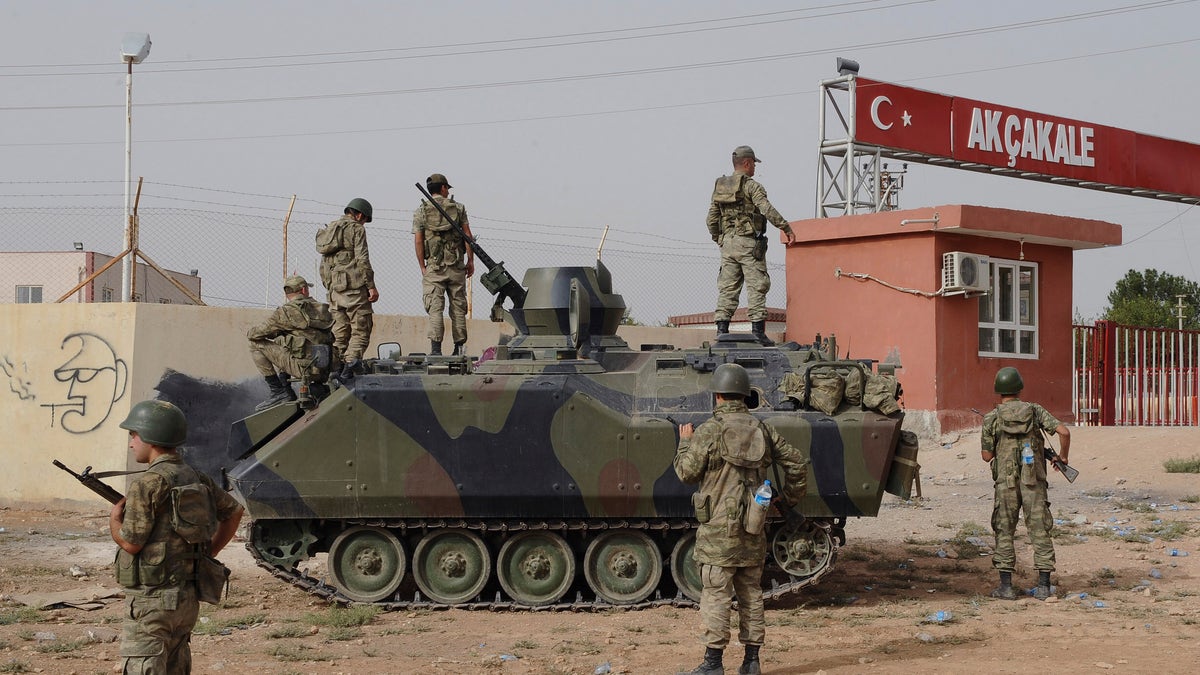
Oct. 7, 2012.: Turkish military station at the border gate with Syria, across from Syrian rebel-controlled Tel Abyad town, in Akcakale, Turkey. (AP)
AKCAKALE, Turkey – Turkey's military on Sunday fired artillery on targets inside Syria for a fifth consecutive day, immediately responding to a Syrian shell that landed on Turkish soil. The exchange kept tensions along the volatile border running high and stoked fears of a regional conflagration.
An Associated Press journalist witnessed the shell landing some 200 meters (yards) inside Turkey, near the border town of Akcakale. A short time later, eight artillery shells could be heard fired from Turkey.
Turkish Foreign Minister Ahmet Davutoglu on Saturday warned that Ankara would respond forcefully to each errant Syrian shell that lands on Turkish soil. The latest Syria-Turkey crisis erupted earlier this week, after a Syrian shell killed five civilians in a Turkish border town.
Inside Syria on Sunday, forces loyal to President Bashar Assad clashed with rebels across the country, from the northern city of Aleppo to the southern border with Jordan. Activists said opposition fighters were strengthening their hold over the village off Khirbet al-Jouz, in the northern province of Idlib, which borders Turkey and where violent clashes broke out a day earlier.
The Turkish state-run Anadolu news agency said Sunday that the rebels had regained full control of Khirbet al-Jouz. It said the Syrian army was forced to "pull back" following an "offensive" by some 700 rebels.
It also reported that Assad's troops were forced to retreat some 20 kilometers (12 miles) toward the town of Jisr al-Shughour. It said rebels in Khirbet al-Jouz celebrated their victory by firing their weapons into the air.
The Britain-based Syrian Observatory for Human Rights said regime forces pulled out of two villages in the Idlib countryside near Turkey. In Khirbet al-Jouz, wounded Syrian soldiers were left to fend for themselves after government troops were forced to retreat from the area, the Observatory said.
The reports could not be independently confirmed, and it was not clear whether the wounded soldiers were captured by the rebels.
In the Turkish town of Akcakale, mayor Abdulhakim Ayhan said shrapnel from the Syrian mortar caused some damage to a grain depot, but no one was hurt. He confirmed that Turkish artillery immediately returned fire.
The Anadolu Agency reported that Assad's forces have been shelling the town of Tal Abyad, just across from Akcakale, which is controlled by Syrian rebels.
Ankara has vowed to retaliate against the shelling from Syria while Turkey's parliament this week approved a bill that would allow cross border military operations there. Turkish Prime Minister Recep Tayyip Erdogan has warned Damascus not to test Ankara's patience.
Turkey's private Dogan news agency reported that a six-vehicle military convoy, including two carrying howitzers, was seen traveling from the city of Gaziantep toward the Syrian border.
Once close allies, Turkey and Syria have become fierce foes since the uprising against Assad began in March last year. Ankara became one of the harshest critics of Assad's crackdown while Syria accused Turkey of aiding rebels.
Elsewhere, Syrian troops were widening their offensive to retake rebel-held areas in the northern city of Aleppo and the suburbs of Damascus, as well as the central province of Homs and villages on the southern border with Jordan.
The Observatory said some of the heaviest fighting Sunday was in Aleppo province, where at least three people were killed and scores were wounded when the army pounded the town of Manbaj in Aleppo's suburbs.
Syria's defense minister said Saturday that the government is ready to give amnesty to rebels who repent and those who don't "will be crushed under the feet of our soldiers."
Gen. Fahd Jassem al-Freij, who became defense minister in July after his predecessor was assassinated, also claimed that the regime was getting the upper hand. "The most dangerous parts of the conspiracy have been passed and the killing is on its way to decline," he said.
Damascus denies it is facing a popular uprising, instead blaming the violence on a foreign conspiracy linked to its support for anti-Israeli groups such as Lebanon's Hezbollah.
Despite his claims of government troops being on the brink of restoring stability, the violence across the country shows no signs of abating. Activists say that more than 30,000 people have been killed since the anti-Assad uprising began.
